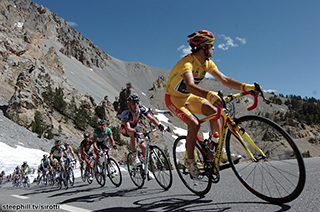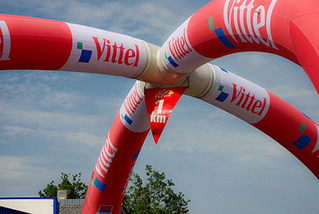Tour de France Strategies and Terms
Previous: Tour de France Jerseys Explained
Introduction:
The Tour is a complicated tapestry of rules and regulations, rich traditions, and fancy French vocabulary all woven together with blood, sweat, and tears. Sorting it all out can be a little intimidating and confusing to those who are new the colorful world of cycling fan-dom.
We have enlisted the help of our good friend Demian Bigelow, a cycling enthusiast, quasi-retired bike racer, and person who has actually attended the Tour de France to help you gain a better understanding of this seemingly uber-complex World Series of Cycling event.
What are the key strategies for teams?
Is there is one particular key thing or idea that non-cyclist types need to know in order to understand the mysterious ways of bicycle racing and the Tour de France?
DB: Actually, there are two key concepts that are clutch in understanding the essence of bike racing:
-
It's not about going as fast as you can, it's a game of strategy and efficiency. The faster you go on a bike, the more of your energy is used to move the air out of the way (wind resistance).
 I forget the numbers exactly, but at 25mph, I think it's like 80%. So if you can position yourself behind someone else, you can use a fraction of the energy that he is using. The more you are protected, the less energy you use. This is called "drafting".
I forget the numbers exactly, but at 25mph, I think it's like 80%. So if you can position yourself behind someone else, you can use a fraction of the energy that he is using. The more you are protected, the less energy you use. This is called "drafting".It's why the group ("peloton") rides so close together. It changes everything about what is possible. If someone can ride in a protected place (called "sitting in") for a whole day, they can sprint at 40mph at the end of a 120-mile day. If you can force someone into the wind, you can wear them down. If the guy in front of you is tiny, you are working as hard as he is. In a bike race, the wind is your enemy and it affects all your decisions.
-
Cycling is a team sport. Often people do not realize that In bike racing, teams share the winnings. So even if I'm not on the podium, I might get a check. That means I'll be willing to sacrifice my race to push the pace or to chase down someone that is getting away. So when you see a racers making a move, it's unlikely they are doing it for themselves. Most of the team rides for their best rider.
So when you combine points one and two, you get some of the most amazing strategies playing out on the course of bike races. Many people think bike races are basically "go as fast as you can from point-to-point". Nothing could be farther from the truth.
ST: That's fascinating! Once again, we're intrigued and impressed by the amount of calculated strategy and knowledge of really intellectual stuff like physics and aerodynamics that happens out on the course in bike racing.
Based on what we've learned so far, it seems like a complex, beautiful combination of smart racing tactics, technical savviness, teamwork, guts, fierce mental tenacity, and unparalleled physical endurance. We're starting to get pretty excited about this!
I don't know these strange words!
Okay, this is all starting to come together for us now, but we still need to talk about vocabulary. We want to know exactly what those awesome European commentators are talking about as we follow The Tour this year. Any helpful French cycling lingo you might enlighten us about?
DB: Well, we have already sprinkled some key vocabulary throughout this interview, but here are a few more that haven't come up yet: One of my personal favorites is "flame rouge" which means red flag. At one kilometer to go, there is always a big white scaffolding setup that bridges over the road with this tiny little red flag hanging down. From that point to the end, we hold our breath.

Flame Rouge
Another important one to know is "domestique." This is the name for the riders that care for the leaders on their team. They will ride back to the team car for food and water, stuffing six or eight bottles in pockets and down their shirt and then bring them back up to their leader. They will give up their wheel if their leader flats or they will chase down anyone that threatens their leader's time advantage.
Domestiques are the guys that make the leaders look good. Cycling is a team sport and for every leader, there is an army of silent domestiques.
ST: Awesome! Thanks for bringing our Le Tour terminology up to speed! We can't wait to throw around all these fancy new words as we cover this year's tour!
See original art from the Tour de France series
Quick Navigation:
- An Introduction to the Tour de France
- Race Format and How to Win
- What Those Jerseys Really Mean
- Thinking in Cyclist Terms
| Article written by Ellen Moss, Social Media Manager, Zone Five Software Inc. |
